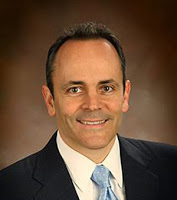Open comment period begins today for Gov. Matt Bevin’s Medicaid request to feds for Medicaid waiver; ends Oct. 8

Kentucky Health News
Kentuckians have 30 days to let the federal government know what it thinks about Gov. Matt Bevin’s new Medicaid plan, starting today and ending at 11 p.m. Oct. 8.
 |
| Gov. Matt Bevin |
“We look forward to the public input that will be received over the next 30 days,” the Republican governor said in a news release. He said the plan “will allow us to provide Medicaid coverage that ensures better health outcomes for Kentuckians in a fiscally responsible manner. Without it, there will be no expanded Medicaid in Kentucky, so we look forward to working with CMS to ensure this coverage continues.”
CMS is the Centers for Medicare and Medicaid Services. The plan is called Kentucky HEALTH, standing for Helping to Engage and Achieve Long-Term Health. It seeks a waiver from federal Medicaid rules, under a law allowing five-year demonstration programs.
Bevin continues to say that if this waiver is not approved, the state will no longer provide Medicaid coverage to the 430,000 Kentuckians who now qualify for the program under his Democratic predecessor’s expansion of Medicaid under federal health reform to those who earn up to 138 percent of the federal poverty level.
But when Kentucky Health News asked him in August if he was willing to negotiate with Health and Human Services Secretary Sylvia Burwell, he said, “Absolutely. That’s where we are in the process.”
Burwell has indicated that the process could easily continue until after the November election, in which Republicans hope to take control of the state House and the White House. She told former Gov. Steve Beshear in a July 21 letter, “Medicaid waivers in other states have often taken between six to 12 months to negotiate.”
The Bevin administration submitted the formal Medicaid plan to Burwell Aug. 24. In a statement, the Department of Health and Human Services said that opening the federal comment period only signifies the completeness of the application for an 1115 Medicaid expansion waiver.
“Application completeness is an early step in the waiver review process, and simply means that the waiver contains sufficient information to evaluate it,” HHS Press Secretary Marjorie Connolly said in the statement. “After the comment period and review and consideration of public input, the waiver process usually involves significant additional dialogue between HHS and states.”
The most controversial parts of the plan include requiring premiums to those with incomes below the poverty level that could prevent access to care and the work requirements for able-bodied adults who aren’t primary caregivers, both conditions that Burwell has said she would not approve.
“We are prepared to continue working for as long as it takes to find a solution that builds on the historic progress Kentucky has made under Medicaid expansion and avoids moving backwards,” Connolly said.
The proposal mainly targets able-bodied adults who qualify for Medicaid under the expansion and is designed to encourage participants to have a higher level of involvement in their health care. It does not affect children, pregnant women, the medically frail and adults who were eligible for Medicaid before the expansion.
Bevin has said that the state cannot afford to have 1.32 million people, nearly 30 percent of the state’s population, on Medicaid.
The proposal says it “is expected to save taxpayers $2.2 billion over the five-year waiver period,” by reducing enrollment in the program, but only $331 million of that would be state tax money, because the federal government covers the bulk of Medicaid costs.
The federal government is paying the full cost of the expanded Medicaid population through this year. Next year the state will be responsible for 5 percent, rising in annual steps to the federal health-reform law’s limit of 10 percent in 2020. The state pays about 30 percent of the cost of traditional Medicaid participants.
Click here and follow the prompts to submit your comments. Click here to see the full report.